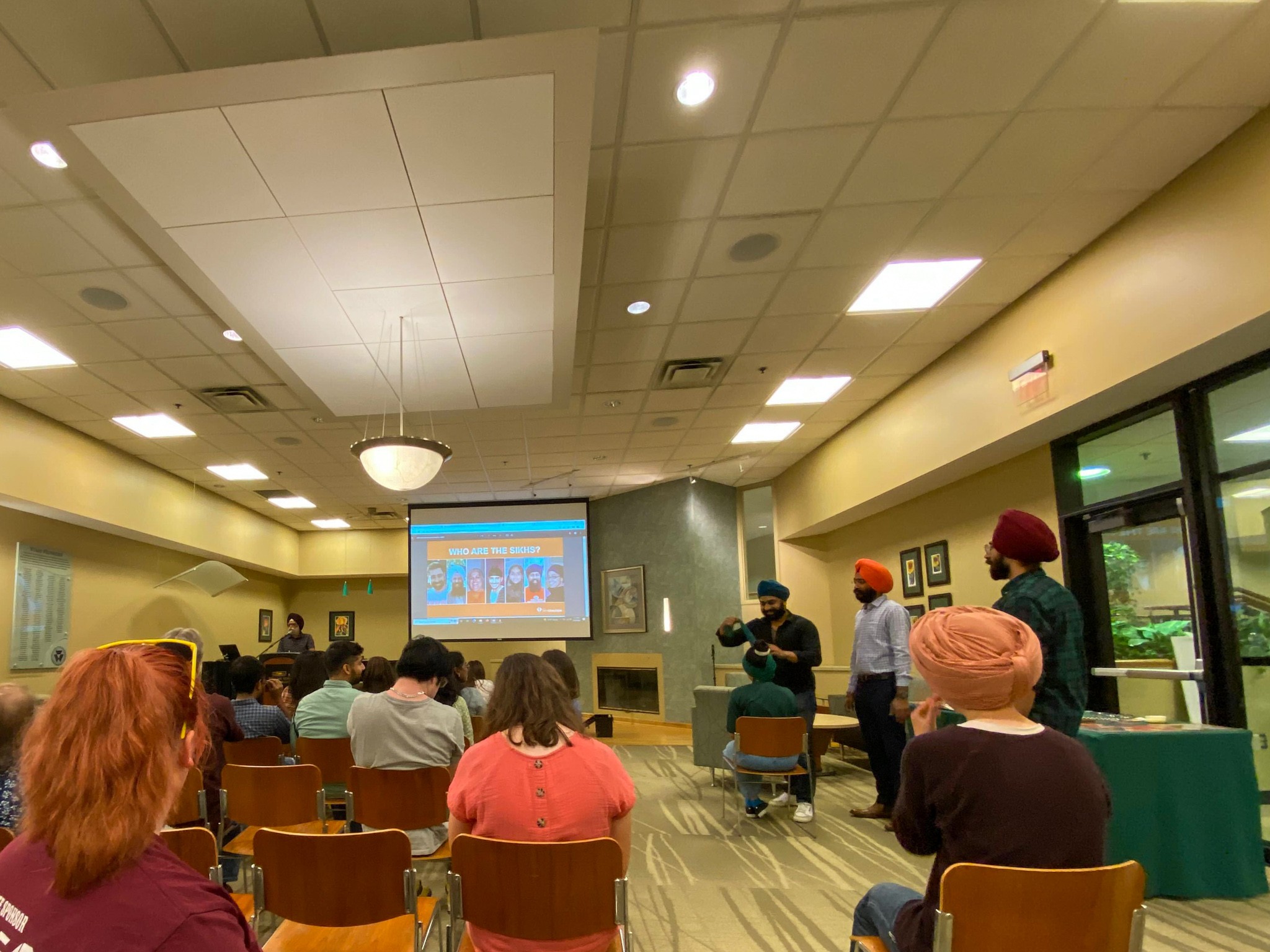
Sikhs in America & at WSU | Photo by Alexis Lewis | The Wright State Guardian
Sikhs on the Wright State University campus voiced experiences, educated others and promoted religious, cultural and historical dialogue at a recent global event.
Sikhism
Sikhism originated in the Indian region of Punjab in the early 16th century. According to professor of religion Dr. Valerie Stoker, the earliest evidence of Sikhs in America dates to 1903 with the first Sikh place of assembly and worship, a ‘gurdwara,’ being built in 1912.
“There are 25 million Sikhs worldwide and while most live in India, there are Sikh communities in many countries,” Stoker said.
The word ‘Sikh’ means ‘student’ or ‘disciple,’ meaning that Sikhs are always learning new things. Stoker further explained core Sikh beliefs.
“Sikhism does not believe in anthropomorphic depictions of the divine being and as part of this, God is said to be without gender. The tradition emphasizes the equality of all people and the unity of humankind,” Stoker said. “It therefore advocates an engaged ethical life of service to one’s community and working to overcome divisions in society, including those that are religiously based.”
Sameep Singh, a WSU Sikh alumni, explained the spiritual path of Sikhism.
“There’s an aspect of [Sikhism] that’s spirituality, and it does tell you as all faiths teach you: be a good human being, live an honest living, do meditations as well,” Sameep Singh said.
These meditations align with the belief that the physical body is a temple of God; therefore, this experience is seen as a selfless service to others and to God.
“When we meditate on the name of God, it brings us a sense that light of Waheguru (God) is in everyone,” Sameep Singh said.
Sameep Singh also mentioned three pillars of Sikhism.
“A Sikh’s motto is Naam Japo, Kirat Karo, Vand Chhako, i.e remember God, engage in honest labor and share the fruits of that labor,” Sameep Singh said.
Experience at WSU
Harroop Singh, a current WSU Sikh student, mentioned that many people in America are curious about Sikh turbans, appearance and religious practices.
“It gives us a different look,” Harroop Singh said. “My experience is, I mean, not all the native people of America know about us.”
Sameep Singh mentioned that after the four coordinated Sept. 11, 2001 attacks on the United States by al-Qaeda, people began to look at the Sikh community differently.
“After 9/11 happened, we were mistaken for other people. Things changed in a day,” Sameep Singh said. “Everybody was curious about ‘who are these guys related to [Osama bin Laden],’ even though none of the attackers or terrorists had a Turban or a beard, but it was these pictures of this one person that got here on the TV all the time. It felt like there was fear now.”
Despite these perceptions, Sameep Singh noted that faith overcame fearful looks.
“It is my faith that kept me strong, it was our rich history as well,” Sameep Singh said. “I cannot give up my faith just to be scared.”
The event
‘Sikhs in America & at WSU’ took place in the Pathfinder Lounge of the Student Union on Friday, Sept. 16 as a collaboration between the Sikh community of WSU and the University Center for International Education.
There were over 50 attendees who experienced traditional food, turban tying and dialogue among the Sikh community. Dr. Kuldip Rattan, Professor Emeritus, provided the reason for holding the event.
“We hope to tell you who we are and where we come from,” Rattan said.
Sameep and Harroop Singh also noted celebrations of diversity and inclusion as reasons for the event.
Sikhs shared information about the holy book (Guru Granth Sahib), the 10 Gurus (or spiritual masters) and five articles of faith, or ‘5 Ks’ (Kes, Kanga, Kachera, Kirpan and Kara), followed by a question and answer session.
Freshman psychology major Angela Joy “AJ” Allen described the experience of the event.
“I have never heard about a cultural event like this at Wright State,” Allen said. “I don’t know much about Sikhism.”
The event wrapped with disbursement to investigate tables with informational pamphlets, books and items related to Sikhism, including the 5Ks and related pictures.
“We want everyone to know each other and promote love,” Sameep Singh said. “We are here as a loving community.”
